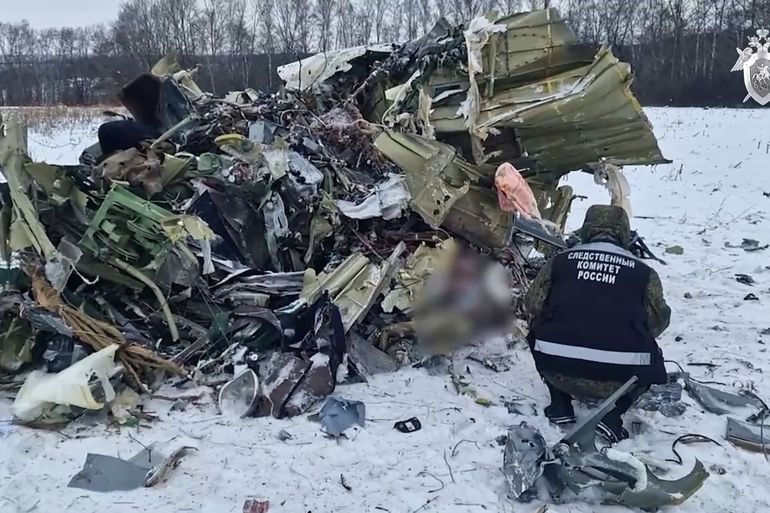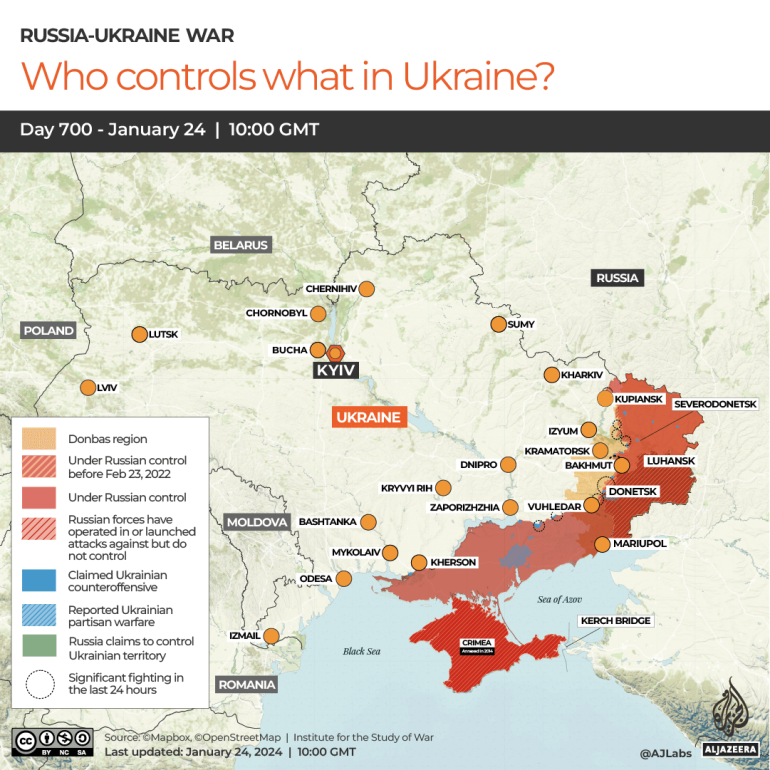‘Propaganda, provocation’: Did Ukraine down a plane with its POWs aboard?
Confusion abounds days after a Russian military jet crashed near the Ukrainian border, reportedly killing dozens of people.

Kyiv, Ukraine – Two days after a Russian military cargo plane was shot down near the Ukrainian border, unanswered questions loom as Moscow and Kyiv offer starkly conflicting versions – and insufficient proof.
Moscow claimed the Il-76, with 65 Ukrainian war prisoners on board, was about to land in the western city of Belgorod on Wednesday in advance of a swap later that day.
Keep reading
list of 4 itemsAt least 18 killed in wave of Russian missile attacks on Ukraine
Drones attack deep in Russia as Medvedev threatens Ukraine’s ‘existence’
Ukraine to probe Belgorod crash as Russia questions future prisoner swaps
It purported that Ukrainian air defence forces in the nearby Kharkiv region shot the plane down with two missiles.
Russian lawmaker Andrey Kartapolov claimed three missiles were shot either from a US-made Patriot air defence complex or from a German-made Iris T system.
“Ukrainian leaders knew very well about the swap, were informed how they prisoners would be delivered, but the Il-76 plane was shot down by three missiles,” he reportedly said.
Moscow alleged that all the Ukrainian prisoners, three Russian guards that escorted them, and six crew members had been killed when the plane crashed near the village of Yablonova.
The Ukrainska Pravda news website quoted an unnamed military official saying that the downed plane was “their job”, but the laconic report was soon removed.
Ukrainian President Volodymyr Zelenskyy did not say who or what could have downed the plane, but called for an internal investigation and accused Russia of “playing with the lives of Ukrainian prisoners”.
Kremlin spokesperson Dmitry Peskov retorted by saying that “if [Zelenksyy] means an international investigation into the criminal actions of the Kyiv regime – then one is indeed needed”.
Margarita Simonyan, one of the main Kremlin backers who heads the media network Russia Today, posted the alleged list of 65 POWs on her Telegram channel.

Kyiv said that it had planned a prisoner exchange that day,
It did not confirm the authenticity of the list shared by Simonyan, but said that one person on it had already been swapped earlier this month.
Ukraine insisted Russia provided no information about the plane that in fact had been carrying missiles for S-300 air defence systems.
Mobile phone videos presumably shot near the crash site showed the burning plane and traces of smoke allegedly left by a Ukrainian missile.
Another video of the plane’s alleged debris showed no traces of bodies.
Meanwhile, allegations abounded that Russia would kill captured Ukrainian servicemen kept in Russian prisons and place their remnants in the downed plane’s debris to “provide” proof of Kyiv’s war crime.
“They have the prisoners on the ground and would have to kill them, mess up their bodies and mix the remnants with the plane’s debris,” a Ukrainian military official told Al Jazeera on condition of anonymity.
A top Ukrainian military expert agreed.
“To prove their point, Russians may go very far, including the liquidation of these war prisoners and the dismemberment of their bodies,” Lieutenant General Ihor Romanenko, former deputy chief of Ukraine’s general staff of armed forces, told Al Jazeera.
He said that there is a “high probability” that Ukrainian air defence forces downed the plane, but there was too little evidence to prove it – and to say for sure who and what was on board the plane before it was shot down.
But Romanenko, who spent decades in in air defence forces, said that he had personally seen how two missiles from an S-200 or S-300 complex can fit into an Il-76 cargo plane, a seasoned Soviet warhorse that can carry up to 40 tonnes.
He said that Moscow staged a “provocation” with the plane and will hardly agree to conduct an independent investigation.
The incident reminded him of the July 17, 2014, downing of the Malaysian MH-17 plane with 298 passengers and crew on board by pro-Moscow separatists in the Donbas region.
The separatists and pro-Russian residents in the area said days after the disaster that the CIA “loaded” hundreds of dead and “pre-frozen” bodies onto the plane to “frame” Moscow.
An international investigation based on the analysis of wreckage and intercepted phone calls concluded that the plane was destroyed by the Russia-supplied BUK surface-to-air missile. Investigators said later that there were “strong indications” that Russian President Vladimir Putin approved the delivery of the BUK complex to the separatists.
‘Russian propaganda statements’
Another Ukrainian analyst said that after losing the plane this week, Russia decided to start a propaganda “campaign” while hiding evidence of what really had happened.
“What we see is Russian propaganda statements, an obvious information-psychological campaign against Ukraine and a lack of proof of the Russian version,” Volodymyr Fesenko, head of the Penta think tank in Kyiv, told Al Jazeera.
Russia did not present the bodies of the 65 POWs, and Ukrainian intelligence official Andiry Yusov said that only five bodies had been delivered to the Belgorod morgue.
Moscow also said that only three guards escorted five dozen war prisoners, something that contradicts information about earlier prisoner swaps when each Russian guard escorted three or four Ukrainians.
“There are way too many inconsistencies,” Fesenko said.
To him and other observers, Russia’s claim were reminiscent of the July 2022 incident in the Olinivka camp for war prisoners near the Moscow-occupied city of Donetsk.
Moscow claimed that Ukraine launched a US-made HIMARS missile that hit the camp killing 62 and wounding 130 Ukrainians.
Pro-Kremlin media claimed that Kyiv deliberately killed the POWs who could have testified about the war crimes they had allegedly committed during the 2022 siege of Mariupol.
But Moscow refused to allow finding missions sent by the United Nations and the International Red Cross to enter the facility.
Meanwhile, media analyses based on satellite imagery and post-explosion photos and videos of the prison indicated that Russia’s claims were fabricated and the building was destroyed by a bomb blown up inside the building.
However, an international observer offered a sobering explanation of how the latest disaster could have been caused by a dire lack of coordination between Ukrainian military agencies.
“One military agency was preparing the usually-secret prisoner swap. Another military agency in a no-less-secret mode moved a Patriot or something similar to the Russian border because it knew that something big and heavy was flying beyond it,” Nikolay Mitrokhin of Germany’s Bremen University told Al Jazeera.
“And as soon as they saw [the Il-76 plane] on their monitors, it didn’t occur to anyone to call Kyiv and ask whether a prisoner swap was in the works and could [the prisoners] be on that plane,” he said.
Meanwhile, a Russian lawmaker claimed that some of the Ukrainian war prisoners on the plane had lambasted Kyiv’s war policies, and that Kyiv deliberately destroyed the plane to warn Ukrainian servicemen not to surrender.
“Ukraine created the provocation deliberately so that its nationals don’t surrender,” Russian lawmaker Aleksey Zhuravlyov reportedly said on Wednesday.